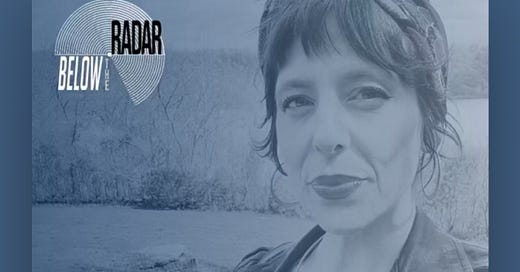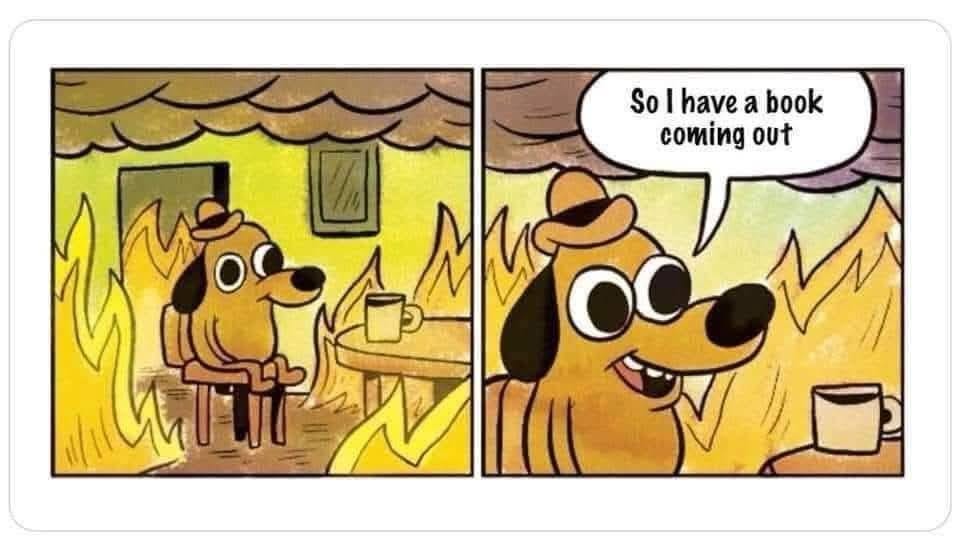I recently had the pleasure of speaking with Am Johal, who hosts a podcast called Below the Radar at Simon Fraser University in Vancouver, BC (where I lived, years ago!) I wanted to share the podcast with you. But I also wanted to share something that emerged from our conversation. I’ve found that, every time I speak about my book Sister Death, I end up talking about the things that I wish I would have included in there, but didn’t. Often, I end up talking—in the most loose and speculative way—about life after death. I’ve actually written about this here before. This time, however, I started talking about love. I’ve posted a few thoughts below, but you can also listen to the episode wherever you listen to podcasts. Or here, on YouTube:
I also wanted to mention (cue the meme below, which those of us who write books have been circulating amongst ourselves) that I speak a bit about my next book project in the podcast as well. It’s not about underworlds—that book is still in the works. I haven’t actually written about this next book much on here, which is under review, but I hope to tell you more about it soon. The title, which could change, is currently More Than Human Worlds: On the Afterlives of Theology. I’ll let the podcast suffice as a teaser, for now.
Here’s the bit of the interview that I captured (Am Johal’s questions are in italics)…
How did this project, and its afterlife (the kinds of conversations you’re having), how has that shaped you or transformed you in some way?
It’s funny that you use the term afterlife. It has left me with a lot of questions about how I want to find my own way of thinking and writing about life after death. I think one of the things that I found as I was working through this project was that I don’t think that I ever really thought through, before this project, the real emotional, psychological, spiritual, and intellectual value of having some form of thinking about life after death or the afterlife. I don’t think that I necessarily have a very formulaic take on what life after death might be. But I have definitely found myself more and more interested in these questions. And I’ve found myself more and more convinced by the value of being able to think about, express, discuss, create visions of the ongoingness of life in the face of—and after—death.
Because I think there is an important shared sense or political dimension to these ideas as well. There’s a value in being able to hold up some sense of ongoingness for one another, in the face of what can often feel like a pretty exhausting and terrible onslaught of death and violence. So that’s one of those questions I’ve been left stewing over.
Is there a way that we can think about death alongside friendship, love, or human solidarity?
When I think about love and death, there’s always that famous biblical invocation of the love stronger than death that I think of. In this idea that we might find, or express, or cultivate a love stronger than death, I think there is this potential to read that as an image of—or invocation of—an enmity between love and death, right? Like a love that can beat death, or be stronger than death. But I don’t think that it has to be read that way, either. One of the things I’m pushing back against, in the book, is this idea that either life or death is a form of the absolute. This is what, I think, causes a lot of anxiety for people sometimes—this idea that either life is the absolute and death is subjected to life, or life is the absolute and life is subjected to death. And I think that part of what I’m trying to encourage is just a sense of uncertainty about the relationship between life and death.
But, you know, I think it’s completely natural in some ways, and productive, to think about what it is that we want to lift up and embrace and celebrate, in our social worlds, that we do find stronger than death or in some ways more ongoing than death. And I think that love is a very appealing figure of something that can kind of outlast, or be sustained in the face of, death.
And I think there’s a sense in which, in some ways, love isn’t possible without death. I think if we aren’t finite, and we don’t remember that we’re finite, and that we’re mortal, I think we often fail to appreciate anyone, let alone some of the people who are closest to us. But I think when we can remember our finitude, and our mutual mortality, I think we’re much more likely to feel the kind of gratitude we need, to open ourselves up to one another. So I think in some regards, death is a kind of enabling power in love. But I also think that there is something about love that is powerful, in part, because it can live beyond or be sustained beyond conditions of death. And I think that’s, you know, one of the things that we feel very acutely when we continue our relationships with the people we love who have gone.







When you write: "life is the absolute and death is subjected to life, or life is the absolute and life is subjected to death," I think the second "life is the absolute" is supposed to be "death is the absolute."
I ran across yesterday, in an essay by David Lodge of all people, the following quotation about Bakhtin: "A fascinating report of a debate in which he participated in 1918 says of Bakhtin, 'At some points he did recognize, and even expressed appreciation of socialism, but he complained of, and worried about, the fact that socialism had no care for the dead.'" I guess I found this striking because it seems clear that "care for the dead" is something Communism is not equipped to provide.
On the other hand, Benjamin's theses on the philosophy of history also come to mind. ("Not even the dead will be safe...")
Dear Beatrice: What a lovely name! I love that you are addressing to topic of death, one that we all try not to think about at all! One conviction I now have, at 82, is that we are not here as human beings, perhaps on a mission to mature, grow, develop and evolve into a high level of knowledge and spirituality. Rather, we are here as eternal spirits, lovely, kind, gentle, extremely intelligent and knowledgeable, on assignment to be earthlings, humans, eventually with much ego, if at all. As eternal spirits, WE DO NOT DIE, although we will drop these earth suits when they have served us well. How else could we ever smell the flowers and see the lovely evenings and touch our loved ones?